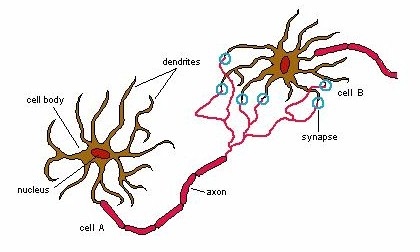Synapse (CCEA)
What is a synapse?
A synapse is the site of communication between the end of an axon and the beginning on a dendrite. It can also be between a neuron and a non-neuron cell such as a muscle cell. In the olden days people used to think that there were no gaps between neurons, and they just extended continuously throughout the body (silly eh?). Now we know better, much better. More for you to learn!

Let’s just get the overall picture first: a signal may be transmitted from one neurone to another via axons and dendrites. A sending neurone passes the signal to a receiving neurone which may pass it onto another receiving neurone, thus becoming itself a sending neurone.
Clearly, each nerve cell (= neurone) only has one axon but multiple dendrites. How does this regulate the way in which certain signals are deemed to pass the threshold required for them to be passed along as opposed to them ceasing there?
There are 2 ways: either multiple signals are sent via the same synapse in a short space of time, or single signals are sent via synapses at different locations. Therefore, the first is called temporal summation while the second is called spatial summation. Summation simply refers to the sum of signals sent to reach the threshold for transmission.
Another nugget to be gotten out of the way: the signal transmitted is always axon –> dendrite, unidirectional, because specific neurotransmitter receptors are only found on the…

